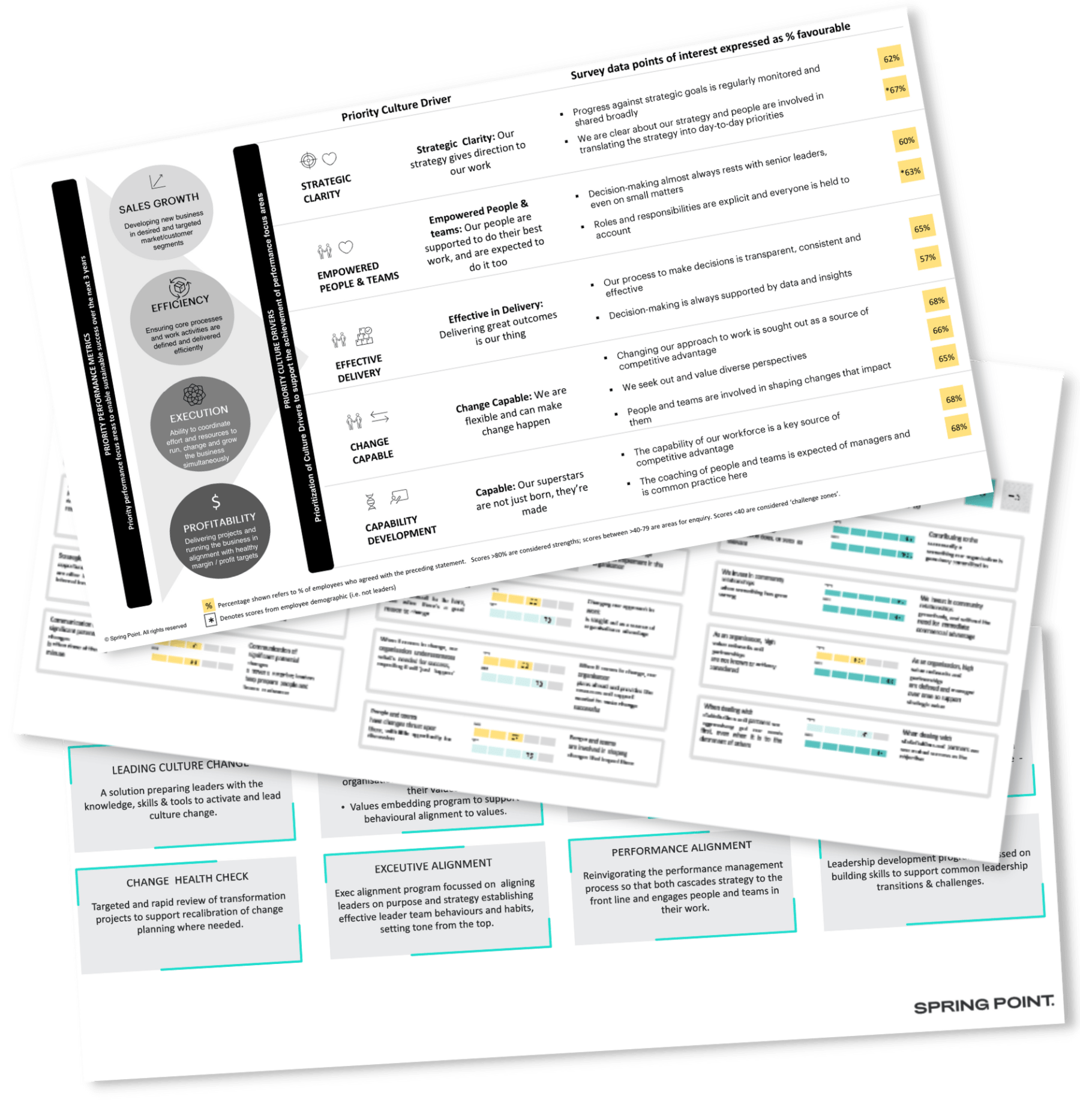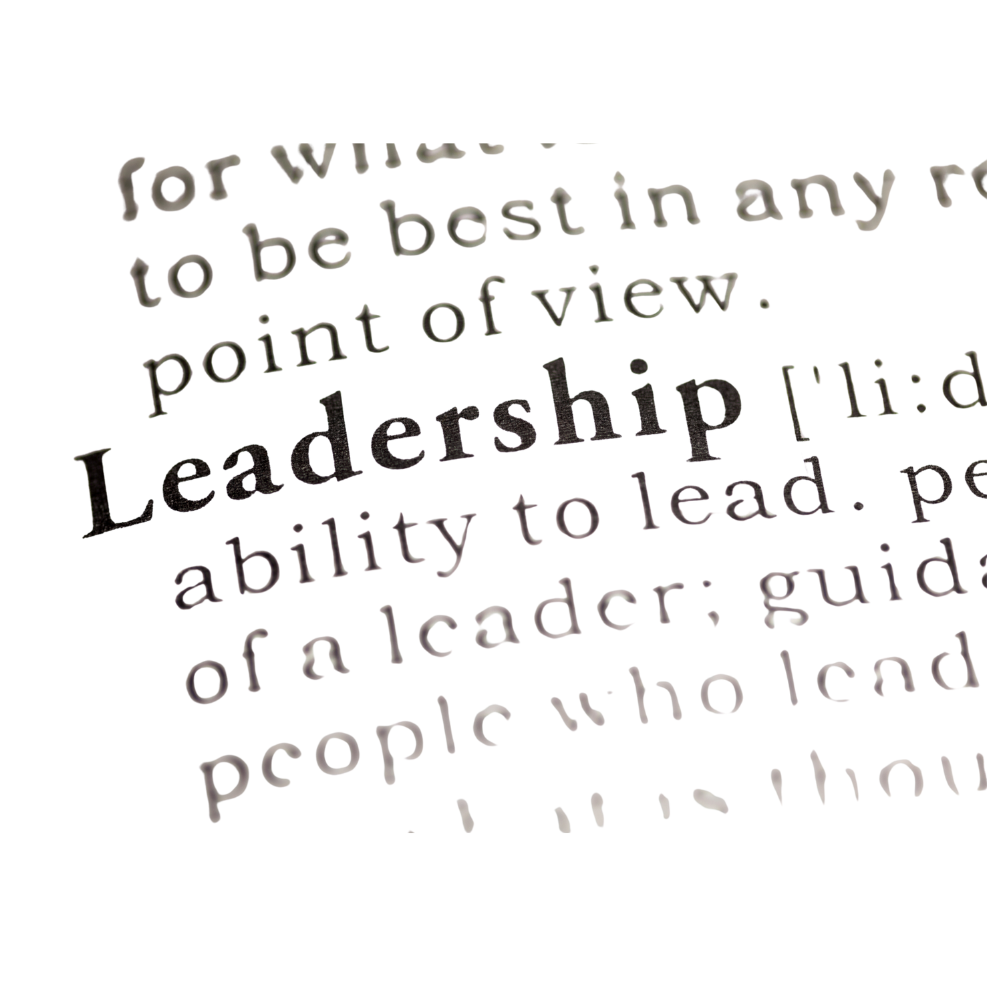ORGANISATIONAL CULTURE
WE HELP ORGANISATIONS LINK CULTURE TO STRATEGY AND PERFORMANCE
The importance of organisational culture to sustainable performance is well documented. Over the past 20 years, research has consistently shown that culture is a significant factor in determining organisational performance. As importantly, culture is almost always found to be a key factor in organisational failure.
The organisational culture change practices of the past 20 years will not deliver the outcomes businesses need to remain
competitive and relevant. Unsuccessful culture change efforts far outweigh those that have positive impact.
At Spring Point we help organisations approach culture as an enabler of business performance rather than seeing it as a compliance activity, or a ‘hit and hope’ project.
WHY ORGANISATIONAL CULTURE?
The case for understanding and managing organisational culture as a strategic priority is well formed, with the links to cultre and performance becoming clearer.
78%
of Fortune 1000 CEOs believe culture to be one of the top three factors affecting their firm’s performance. 1
71%
of global CEOs viewed culture as a top factor positively influencing financial performance, including one-third who ranked culture as the primary factor overall. 2
4X
increase in revenue growth among organisations with strong cultures, according to a study by the Harvard Business Review.
Organisational Culture and Employee Engagement
Understanding the difference between employee engagement and organisational culture is essential for making the right diagnostic and strategic decisions. While the two are often used interchangeably, they serve distinct purposes: engagement reflects how people feel at work, while culture reflects how people behave and why. Both matter—but they answer different questions and require different tools.
| Employee Engagement | Organisational Culture | |
|---|---|---|
| What it measures | How people feel and behave at work day-to-day | The underlying values, norms, and beliefs shaping behaviour |
| Focus | Individual motivation, satisfaction, commitment | Collective mindset, behaviour patterns, ‘how things are done’ |
| Use case | Pulse checks, retention risks, morale, leadership effectiveness | Strategic alignment, transformation, behavioural change, mergers |
| Time horizon | Often short-to-medium term (can fluctuate quickly) | Long-term patterns and embedded assumptions |
| Data type | Primarily perceptual and affective | Behavioural, structural, and symbolic elements |
HOW WE HELP WHEN IT COMES TO ORGANISATIONAL CULTURE
We support the Board, CEO, Senior Executives and front-line teams to define the organisational culture needed to enable strategy, and to activate the culture change necessary to generate alignment, performance and create great places to work.

CULTURE ASSESSMENT
We define and measure culture based on behaviours and work practices and the business outcomes they lead to.
Our powerful, evidence based and commercial diagnostics assess your current organisational culture and inform deliberate design of your culture strategy.

CULTURE DEFINITION &
STRATEGY
Different organisational cultures enable different performance outcomes. We help you to develop a competitive advantage by defining the culture that aligns with your strategy.
Our evidence based approach makes a clear link between the strategic goals of your organisation, and the specific culture drivers that will get you there.

CULTURE CHANGE
We specialise in supporting organisations to deliberately develop their culture to enable performance.
Our methodology, tools and change solutions are grounded in behavioural science and are entirely focussed on helping organisations achieve sustainable and whole of organisation changes in a digital age.
OUR CULTURE CHANGE SOLUTIONS
Common solutions we regularly deliver to our client network are mapped to our PerformX Framework. These enable clients to tailor and deploy world class solutions at speed.
SCALED CULTURE CHANGE METHODOLOGY™️
Our culture change methodology reflects and integrates both behavioural and system change theories. Key aspects include:
- Systemic baseline.
The culture is measured and described behaviourally
- Strategic relevance. Leaders and teams begin to think about and then define the culture needed
- Socialisation and Ideation. People and teams prepare for change through real dialogue that explores ideas to close gaps
- Design and Implement. Ideas are prioritised based on impact, and turned into action plans
- Monitor progress. Frequent and transparent measurement facilitates accountability
- Reflect, iterate and sustain. Core organisational learning practices build an environment that can adopt change
Our approach aligns evidence based and engaging methods, tools and activities to each of these stages. When this sequence of steps are executed organisations are able to create scaled culture change that aligns with strategy.
WHAT DRIVES SUCCESSFUL CULTURE CHANGE?
CULTURE READING
Explore some of our culture change articles and recent culture work case studies.

- Paradigm lost: Reinvigorating the study of organizational culture. | Reserach in Organisational Behaviour Vol. 36 | 2016
- Aligning culture with the bottom line. | Heidrick & Struggles | 2023














